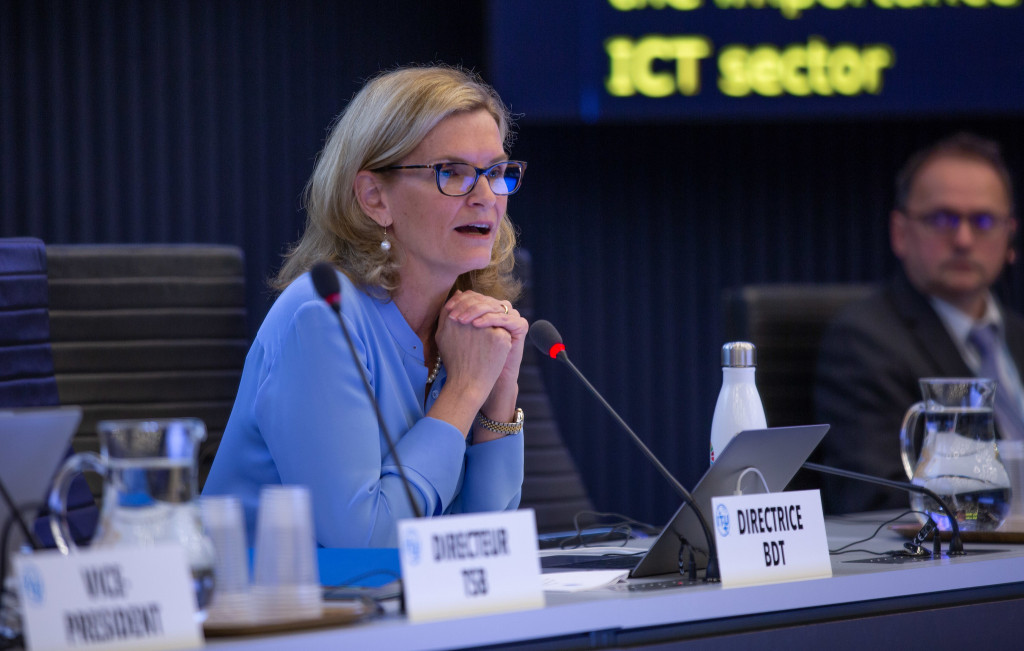On 8 October, Access Partnership hosted an informal roundtable with Doreen Bogdan-Martin, the Director of the Telecommunication Development Bureau (ITU-D) of the International Telecommunication Union (ITU). She outlined her plans for the organisation and addressed some of the most pressing issues for the tech sector, such as marshalling resources to connect the unconnected and achieving the UN’s Sustainable Development Goals (SDGs). Attendees included industry experts from the British ICT sector, as well as government, regulators and trade associations.
Doreen Bogdan-Martin is the first woman to take a leadership position in the 154-year long history of the ITU. Since she assumed office in January 2019, Doreen has introduced a strong change management focus to the organisation by streamlining internal procedures and initiatives into issue-specific clusters. The ITU-D is leading capacity building, cybersecurity, digital inclusion, climate change, and emergency telecommunications initiatives. However, the challenge of “connecting the unconnected” underpins all these projects. According to the ITU, nearly 3.6 billion people remain unconnected from the Internet and thus unconnected from the digital products and services that could dramatically improve their lives. Connecting the unconnected remains the number one priority of the ITU.
One new initiative currently being explored, bearing the working-title of GIGA, aims to provide Internet to schools globally to enhance students’ access to information, opportunity, and choice. It plans to map schools’ demand for connectivity in partnership with governments and aggregate this information to create a financing pool. GIGA would then determine possible solutions based on connectivity requirements, and finally, empower young people with scalable and affordable connectivity.
The success of such initiatives is dependent on multi-stakeholder engagement and leadership from governments, businesses, civil society, technology providers, and finance experts. In order to bring connectivity investments into target communities, the ITU advocates for a strong financing backbone, innovative connectivity technologies such as low earth orbit satellites, mesh technologies and last mile connectivity solutions, as well as accountability from all stakeholders to monitor progress.
Demystify and Engage: Tackling the Challenges of Digital Inclusion
Industry pointed out that one of their main challenges is their inability to understand the role that multilateral processes play in business. The ITU plays a crucial role in enabling international connectivity in communication networks by building the vital global consensus needed in areas such as the allocation of global radio spectrum and the development and international ratification of technical standards that ensure networks and technologies seamlessly interconnect, as well as bringing partners together around initiatives and projects to connect underserved communities. Becoming a Sector Member of ITU gives organisations a voice in the many international and regional conferences and processes aimed at helping bridge the digital divide. The ITU is also open to non-members who create solutions to connect the unconnected, and encourages participation in workshops, seminars and symposiums which bring together stakeholders from all over the world to share best practice, such as the WSIS Forum, AI for Good Global Summit, and ITU Telecom World.
Governments shared that they struggled with the low levels of confidence and hesitation of some developing nations to engage with initiatives. Emerging technologies like AI and 5G are also often viewed with caution. Governments must embrace these challenges and create clear roadmaps to guide the adoption of these technologies, strengthen the supporting infrastructure for development, and set the tone of a collaborative approach among stakeholders so that expertise can be shared.
Some observers expect 5G will widen the gap between the have and have-nots, where a subset of the already connected become super-connected. The ITU is addressing this by driving the adoption of practices that reduce the time and cost of investing in infrastructure. The organisation plays a central role in creating open dialogue for stakeholders to discuss and leverage each other’s expertise.
As we enter Industry 4.0, ‘digital’ underpins every sector of the economy. Allowing half of the world to remain excluded from the digital revolution will have dire consequences for future generations. Start-ups, large multinationals, governments and NGOs all have a duty to contribute to the goal of global digital inclusion. Doreen Bogdan-Martin’s closing remarks sum this up: “SDGs are here to stay. Pick your goal and work towards achieving it.”
Author: Ivan Ivanov, Senior Marketing Manager, Access Partnership





